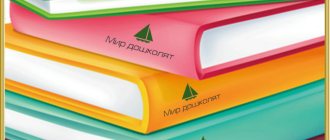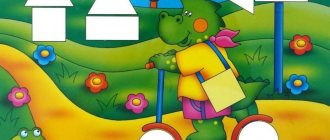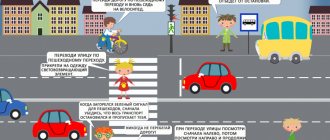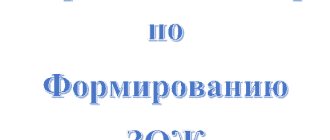Conversation - debate “Road signs”.
Conversation discussion "Road signs".
Target:
recognize, name traffic signs, classify them into groups.
Tasks:
resolve situations according to traffic rules, preventing the most common mistakes on the road, recognizes himself as a competent pedestrian.
Equipment:
road signs, projector, presentation, reminders with crossword puzzles, hats - road signs.
Move
“With the alphabet of streets, avenues, roads, the City gives us a lesson all the time. Always remember the alphabet of the city, so that no trouble happens to you!”
Educator:
Look at the cards and formulate the topic of our lesson.
What do the cards remind you of? (Traffic signs)
That’s right, the topic of our lesson is “Road signs or traffic signs.”
What do you think are the purpose of signs on the road? (Listen to the guys’ opinions)
Educator:
Every Monday you guys go to school. And some of you probably have to cross the road, which means that you should already be familiar with some of the signs. You received a task - to observe what signs you met on the way to school, and count how many there are.
Listen to the children's answers.
Educator:
How many signs do you already know? Let's listen to the poems about road signs that the guys will read to you.
| “No traffic” sign: This sign is very strict, since it is on the road. He tells us: “Friends, you can’t drive here at all!” |
| Pedestrian crossing sign: There is a land crossing here, people walk all day long. You, driver, don’t be sad, let the pedestrian pass! |
| Sign “Pedestrian traffic prohibited”: No pedestrians walk here in rain or shine. The sign tells them one thing: “You are prohibited from walking!” |
| Sign “Underground pedestrian crossing”: Every pedestrian knows about this underground passage. It doesn't decorate the city, But it doesn't interfere with cars! |
| First aid station sign: If someone breaks their leg, doctors here will always help. They will provide first aid, and they will tell you where to go for further treatment. |
| Residential zone sign Children's playground near the house According to the Rules, it is a residential area. A sign will tell the driver - In the yard - be vigilant. Drive quietly, carefully, park where you can. |
| “Children” sign This is a very important sign. It hangs for a reason. Be careful, driver! Nearby is a kindergarten and a schoolyard. |
| Roundabout sign My head spun in a circular motion. The kids played out - In the amusement park. And the driver does not play - In a circular motion, the path continues along the arrow - According to the Driving Rules. |
| Bicycle path sign ” Bicycle path Overtake Maxim Seryozhka. No one will bother you - All children know this sign. |
| Sign “Pedestrian path” On the pedestrian path, only feet walk. Only in a stroller, kids can ride slowly. |
Educator:
Look how different the signs are!
Can they be divided into groups and on what basis? (Children - by shape, by color)
It turns out that road signs can be classified according to what they are needed for, what task they perform on the road.
For example, signs in red triangles are called warning signs
.
(sign with the word) Let's find all the warning signs, name them and place them under the appropriate inscription. – There are also red signs, but they are round. Here is a “No entry” sign, and here is a “No traffic” sign. They prohibit, which means they are... prohibiting
. Let's find all the prohibitory signs, name them and place them under the appropriate inscription. - But the signs are blue. What can the blue circle tell us? (allows).
-Or rather, it prescribes, recommends. Such signs are called prescriptive
.
Let's find them and name them. – And these are service marks
. They tell us what services they can provide us. Let's name them. – We have met some of the signs, but there are many more – Now let’s play!
Physical exercise “Road signs”
The teacher shows the signs, and the children perform various actions depending on which sign is shown.
- “Pedestrian crossing” (walk in place),
- “Pedestrian traffic is prohibited” (stand still),
- “Road work” (imitation - digging the ground),
- “Slippery road” (swing from foot to foot),
- “Bike path” (imitation - riding a bicycle).
“ Guess the road sign” ( pre-prepared guys come out, read the riddle, after the others give the answer, put on the cap of the corresponding sign)
1. I want to ask about the sign. It is drawn like this: In the triangle, the guys are running as fast as they can somewhere. ("Children")
2. Go forward boldly, you are cowardly in vain! Know that this transition is the safest! ("Underground crossing")
3. Do you love bicycles, Do you know the joys of victory, You rush fast with the wind, But you don’t know me? There are only cars driving here. Their tires flash everywhere. Do you have a bicycle? So stop! There is no road! (“No bicycles allowed”)
4. I am a pedestrian's friend, I am a thunderstorm for drivers, I am standing at the crossing - Press on the brakes. A pedestrian! I decided to cross the road safely - I will help you with this, Hurry up to find me. ("Crosswalk")
5. In this place, oddly enough, They are constantly waiting for something, Some are sitting, some are standing... What kind of place is this here? The place is not a secret, you yourself will give the answer now. If we go somewhere, we’ll quickly find the way there! (“Bus or trolleybus stop location”)
6. If you need treatment, the Sign will tell you where the hospital is. One Hundred Serious Doctors There they will tell you: “Be healthy!” (“Hospital”)
7. What kind of sign is here? The pedestrian is crossed out in it. What does this mean? Maybe they are being offended here? ( "No Pedestrians")
Educator:
Guys, who is the main assistant on the road?
(Children: “Traffic light”).
Absolutely right.
And today the traffic light has prepared a task for you. Which color tells us that the path is closed? (Children: “Red traffic light.”) (The child takes a red circle, on the other side there is a situation that he reads out, the others try to solve it. Also with a yellow and green circle.)
Situation 1
Two boys and three girls left school. When they approached the pedestrian crossing, the green signal had already begun to flash. The boys ran across the road at a run, and the girls remained to wait for the next signal. How many guys crossed the road correctly?
Answer: Three girls. A green flashing traffic light warns that it will soon turn yellow and then red. Therefore, the safest thing to do is wait for the next green signal. Running across the road is dangerous.
Situation 2
Six people got off the bus. Three of them crossed the road at the pedestrian crossing, two went around the front of the bus, and one remained at the stop. How many people did the right thing?
Answer: One. The best thing to do is wait until the bus leaves the stop and only then cross the road.
Situation 3
Five kids were playing ball on the road. The two went home. The rest stayed to play on the road. How many guys did the right thing?
Answer: None. You cannot play on the roadway.
Educator:
You guys and I are learning to be competent pedestrians.
But they must also be literate people. Here are words on the topic “Road” with missing letters. Read the word, insert the letter and prove it. Car_mobile v_driver car tr_tuar p_ss_fat d_r_ga station_sh_fer .
Game “Fold the sign”
(children divide into groups,
open the envelope, take out parts of the sign, fold it and remember what it is called)
Reflection.
Educator:
Let's summarize our lesson with you. What do you know about road signs? What are they needed for? What happened? (using the cards they worked with at the beginning of the lesson, the guys make sentences - what worked, what didn’t quite work) What is the main conclusion you should take with you? What background do you think the “Follow the traffic rules” sign should be displayed on? Why? What shape should this sign be? Why? The children receive a reminder about traffic rules and road signs.
Occupational Safety and Health
Target.
Strengthen children's knowledge about the rules of behavior on the street; remember famous road signs - transition; introduce new signs: “zebra”, attention, caution, children.
Keywords:
road signs, traffic lights, pedestrian crossing, zebra crossing, traffic island.
Material.
Road signs (“Pedestrian crossing”, warning signs, prohibition signs, directional signs), workbook.
Progress of the lesson
Educator.
Guys! Until now, you have been walking the streets with your dads and moms, but soon you will go to school and you will have to walk the streets on your own. There are a lot of cars moving on the streets and roads, and it is dangerous to cross the street in the wrong places wherever you want. From the outside it may seem that there is complete chaos on the street: buses, trolleybuses, cars are driving along the roadway. The sidewalks are full of hurrying people. In fact, all movement on the street occurs according to strict rules - traffic rules.
To drive through a stormy, noisy, loud, talkative street - Be careful on the way!
There is a pedestrian crossing at every intersection. It’s easy to cross the road here without risk or hassle.
Educator
shows the children road signs and reads a poem:
The city in which you and I live can rightly be compared to a primer. Here it is, the alphabet - Above your head.
What is it, really. It's like we're on a carousel! We are on the square with you, - There is no straight road here.
The ABC of streets, Avenues, roads, The city gives us a lesson all the time. Y. Pishumov
What lesson does the city teach us every day?
There are many different road signs on the streets. Road signs are the best friends of drivers and pedestrians. Each sign has its own name. Road signs tell you what the road is like, how to drive, what is allowed and what is not allowed.
Warning signs: be careful, there is danger ahead. What's the danger? The image on the road sign will tell you about this. For example, the “Children” sign tells the driver to be careful.
Round signs with a red border on a yellow or white background are prohibition signs. The strictest of them is “No movement”. This sign prohibits the movement of buses, cars, and trolleybuses.
The "No Entry" sign does not allow any cars to enter the street.
Blue square indicator signs. They will show the way to the dining room, to the telephone.
The teacher invites the children to complete a task in their workbook: draw the signs that they remember and tell what they mean.
They place the road signs that the children learned during the lesson in the play corner.
Conversation on traffic rules in 3rd grade
Summary of an extracurricular lesson on traffic rules: “Road signs.” (3rd grade, deaf children)
Conversation on traffic rules for 3rd grade students. Road signs
Author: Bestik Irina Viktorovna, teacher of the Regional Special (Correctional) Boarding School for Children with Hearing Impairments, KSU, Republic of Kazakhstan, North Kazakhstan region, Petropavlovsk. Description: a summary of an extracurricular lesson on traffic rules is intended for teachers and primary care educators in correctional boarding schools. Introduces primary school students to the types of road signs. Purpose: to familiarize students with road signs. Objectives: educational
- to introduce younger schoolchildren to the concept of “road sign”, with groups of road signs, - to repeat and consolidate the basic concepts and terms on traffic rules, - to learn to answer the teacher’s questions, - to broaden the horizons of students on traffic rules;
educational
- to develop skills for safe behavior on the street, - to instill interest in learning the rules of the road;
correctional and developmental
- to develop students’ logical thinking and memory, - to activate students’ speech during class.
Equipment: multimedia presentation, cards, tablets, lotto “Road Signs”, pictures and signs for educational games.
Progress of the lesson:
1. Organizational moment. - Hello guys! - Hello! — Turn on the equipment and put on headphones. — We will listen carefully, talk, answer questions. Working behind a screen.
— How many lessons were there today?
— There were five lessons. — What lessons were there today? — Mathematics, grammar, reading, drawing and PPO. — How many lessons will there be tomorrow? — Tomorrow there will be six lessons. — What lessons will there be tomorrow? — Grammar, mathematics, Kazakh language, speech development, knowledge of the world and physical education. - What should we do first? - First we will do speech exercises. — What is the duty sound? - The duty sound is “o”. - We will speak clearly, concisely and intelligibly. Speech exercises.
These are road signs, clear and simple.
And each of them says: “Here is a turn, And here, on the contrary, the passage is closed!” 2. Introductory part. — Today we will make an exciting journey to the country of traffic rules. What is traffic rules? — These are the rules of the road. — Why do children and adults need to know the rules of the road? — Without knowing the rules of the road, it can be unsafe on the street. - Guys, what is this? — These are road signs.
— Road signs help regulate traffic on the roads, warn drivers and pedestrians about danger, and show where they can and cannot go. So that the cars do not rush, the pedestrian walks calmly, these signs decided to help us all year round. Today in class we will get acquainted with the types of road signs. 3. Main part. — Road signs are divided into seven groups. There are warning signs. They inform you when you are approaching a dangerous section of the road. What shape are these signs? — These signs are triangular in shape.
- What colour? — The signs are white with a red border. — Look at the pictures, what do the warning signs indicate? Didactic game “Warning Signs” Children find a warning sign in the pictures and read out what the sign warns about, using the support plate to answer “The warning sign informs...”.
For example: - A warning sign indicates a slippery road. — A warning sign informs about road works. — The second group of road signs is called prohibitory signs. They introduce or lift certain movement restrictions. These signs are round in shape and are white with a red border. Name the most famous prohibitory sign. - No entry.
The third group of road signs are called prescriptive signs. These signs show the direction of travel, the minimum speed, and the movement of a certain type of transport. They have a round shape, the background of the sign itself is blue with a white border.
— The fourth group of road signs is called priority signs. They establish the order of passage of intersections, intersections of roadways or narrow sections of roads. They come in different shapes and colors. Draw three different priority signs in your notebooks and sign them. - What have you done)? — I drew priority signs and signed (a).
- We will have a rest.
The game is called "Bring the Road Sign to Life." Physical exercise “Bring the road sign to life” The class is divided into two teams.
Each team “animates” one road sign. For example, one of the students depicts a car, and several students depict animals that cross the road. The audience must guess that the players have “animated” the “Cattle Drive” sign. — The fifth group of road signs is called information signs. They introduce or cancel certain movement modes and indicate where this or that object is located. What shape and color do these signs have? - They are square or rectangular with a blue background or with a white background and blue border. Give examples of information and directional signs.
— The sixth group of road signs is called service signs.
They inform about the location of the relevant objects. For example, where is the hospital or where you can relax. — Guys, look carefully at these pictures and try to place the information and service signs in the correct places. Didactic game “Put up road signs.”
The class is divided into two teams. You need to correctly place the road signs in the pictures (road signs - parking lot, bus stop, hospital, telephone, pedestrian crossing, tram stop, food station, rest area). The first team places service signs, and the second team places information and directional signs. Kids are playing.
And the last group of road signs is called additional information signs (plates).
They clarify the effect of the signs with which they are used. For example, they clarify the distance to the object, the zone or direction of action. - And now I suggest you play the “Remember the Signs” lotto. Didactic lotto game “Remember the signs.” You need to correctly connect cards with images of road signs with their names. Kids are playing. 4. Final conversation. - What did we do? - We talked, played, talked. - What did we talk about? — We talked about road signs. Control questions.
— What are road signs needed for? — Name the groups of road signs. — Which of them have you met on the streets of our city? — What signs do you think pedestrians need to know? — What signs should drivers know? Road signs have a special language, and everyone needs to get used to reading them. And at first glance I would be able to understand what kind of danger we should expect on the road. I hope everyone knows what all the signs mean? Take off your headphones and you can relax.
We recommend watching:
An extracurricular event on traffic rules for primary schoolchildren. A class hour scenario on traffic rules for children in grades 1-3. A conversation on traffic rules for grade 3. Notes Conversation on traffic rules for 3rd grade students. Rules of conduct in public transport
Similar articles:
Traffic rules for cyclists
When and where did road signs appear?
Warning road signs. Information for schoolchildren
Road signs. Priority signs. Information for schoolchildren
Road signs. Mandatory signs. Signs of special regulations. Information signs. Service signs. Additional information signs
MAGAZINE Preschooler.RF
GCD for traffic rules “Why are road signs needed”teacher of secondary group No. 8 MADOU d/s "Fairy Tale" (Ak-Dovurak, Republic of Tyva) Saryg-ool Ch.S.
Goals: to introduce children to the concepts of “road” , “sidewalk” ; introduce road signs “pedestrian crossing” , “zebra crossing” , introduce the “traffic light” ; consolidate knowledge about the rules of behavior on the road; cultivate attention, concentration, sensitivity, responsiveness.
Materials: toy squirrel, pictures with various situations that arise on the road, cardboard circles (red, yellow, green).
Org. moment (surprise moment)
- Guys, today a forest guest came to our lesson - Squirrel. Let's smile at Belka, smile at each other, smile at the guests, and say in unison, “The sun has risen, hurray!” It's time for us to get busy."
Progress of the lesson
-Guys, Squirrel came from the forest. She's never been to the city.
-And Belka also wants to take a walk around the city, but doesn’t know the rules of behavior on the street. Guys, can we help him?
Listen and guess the riddle.
Mushrooms have born one sprout, stand along the path - straight backs,
When the old mushroom breaks down, a new one grows. -What is this? (Street)
The teacher displays a picture of city streets.
-Guys, there are so many cars, the houses are so big. And we are so small in comparison. Therefore, you and I must know how to behave on the street so that trouble does not happen.
(the teacher uses illustrations, the children show parts of the street).
This road is called a carriageway, (in unison and individually) only cars drive on it.
You can’t play on the roadway, otherwise something bad might happen.
And this road is called a sidewalk; people walk along it. People who walk on sidewalks are called pedestrians. (repeat in chorus and individually)
Problem situation:
- Guys, if only cars drive on the road, and you need to get to the other side of the road, what should you do? We think.
-Who knows where you can cross the road? (there are special places where they cross the roadway)
-What is the “zebra” ?
-Guys, let's explain to Belka where to cross the road. Remember Dunno, the road is crossed at a zebra crossing. (show zebra)
“Pedestrian crossing” nearby (show sign)
-Before crossing the roadway, you need to look left, right, and then you can cross.
-And in big cities there is a special device - a traffic light. -And what is a traffic light for? (a traffic light is needed to regulate traffic so that there is order on the streets.)
-The traffic light also helps us cross the road.
-When the red light is on, you cannot cross the road; when the yellow light is on, you must prepare to cross the road; when the green light is on, you can already cross the road.
3. Practical part.
-And now, together with Belka, we cross the road. (The children and Belka cross the road along the zebra crossing.) We looked left, right, there were no cars, we crossed the road.
Game "Traffic Light"
The teacher shows circles of traffic lights. When the light turns green, children stomp their feet; when the light turns yellow, children clap; when the light turns red, they stand still.
Fizminutka
The guard is walking stubbornly, (walking in place) He waves at people: “Don’t walk! (moves your arms to the sides, down, up. Here the cars drive straight. (arms straight) Pedestrian, just wait! "
Look, he smiled. (hands on the belt) Invites us to go (walking in place) “You machines, don’t rush! (claps hands) Let the pedestrian pass! " (jumping in place)
-Well done guys, we played.
Did. game “Assemble a traffic light”
-Now come to the table, children. Let's play the game “Build a traffic light”
On everyone’s table there are circles of different colors and rectangles. Let's assemble a beautiful traffic light from circles and rectangles
- Who did it?
Reflection. Guys, did you like the lesson?
-And I liked the way you worked.
-What new did you learn?
-Did you help Belka cross the road?
-Well, Belka, now you know how to cross the road in the city?
- Dunno said that he now already knows how to cross the road and thanks you children. And he treats you to chocolate medallions.
| Next > |




